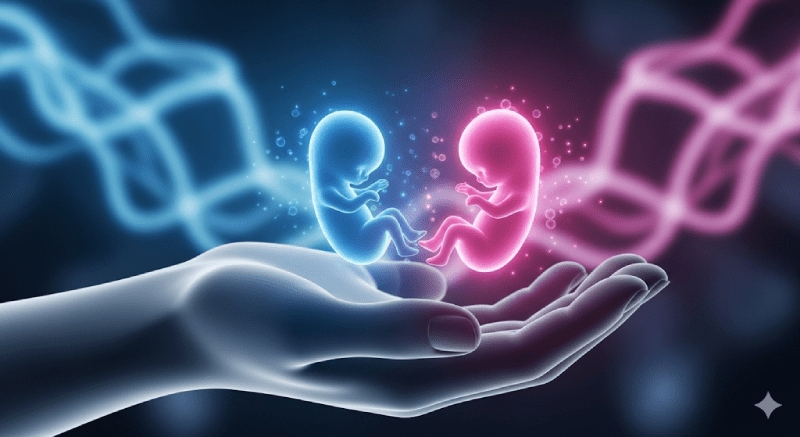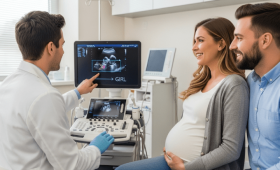What is gender selection in IVF treatment?
Gender selection in IVF treatment is the process of determining the gender of embryos using genetic screening (PGT) methods and transferring the embryos of the desired gender to the expectant mother’s uterus. This method is generally applied for family balancing purposes or to prevent gender-linked genetic diseases. Embryos fertilized in a laboratory setting are subjected to PGT testing to examine their chromosomal health and gender. This ensures that a healthy embryo of the desired gender is selected.
Why is gender selection performed?
Couples usually prefer gender selection treatment for two main reasons. The first reason is family balancing. Couples who already have a boy or a girl may wish for their new baby to be of the opposite gender. The second and more important reason is medical reasons. Some genetic diseases may only appear in children of a specific gender. In this case, gender selection is applied in conjunction with PGT-M (single gene disease screening) to prevent the disease from being passed on to the baby.
Is gender selection legal in all countries?
No, gender selection is not legal in all countries. In many European countries, gender selection is illegal or subject to very strict rules for ethical reasons. However, in some countries like Cyprus, it can be legally applied for family balancing and medical reasons. This makes Cyprus a popular destination, especially for patients from Europe and other regions. It is very important to research the legal regulations of the relevant country before applying to a clinic for gender selection.
What is the success rate of gender selection treatment?
The success rate of gender selection treatment is quite high when the selected embryos are transferred. Thanks to the PGT method, the embryo to be transferred is confirmed to be genetically healthy, which increases the chances of implantation and pregnancy. Success rates vary depending on the expectant mother’s age, egg and sperm quality, the number of embryos selected, and the clinic’s experience. In young patients, this rate can be as high as 70-80%.
How is gender selection performed technically?
Gender selection is performed by conducting a Preimplantation Genetic Diagnosis (PGT) test on the embryos. After the standard steps of IVF treatment, such as egg retrieval and fertilization, the embryos are left to develop. At the blastocyst stage of development (day 5 or 6), a few cells taken from the outer layer of the embryo are examined using a biopsy method. As a result of this examination, the genetic structure, chromosome count, and gender of the embryo are determined. Healthy embryos of the desired gender are selected for transfer.
In Vitro Fertilization (IVF) with Gender Selection is a medical procedure that uses advanced technology and advanced fertility treatments to help couples choose the gender of the embryos which will be implanted into the uterus. The success of IVF with Gender Selection depends on a variety of factors, including the quality of the eggs and sperm, the age of the couple and their response to the medication used during the IVF process. Since IVF with Gender Selection is a relatively new technique, the success rates of this procedure vary from country to country.
In the Cyprus, the success rate for IVF Gender Selection is relatively high. Success rate is about 85 percent for each embryo transferred.
In the United States, the success rate for IVF with Gender Selection is relatively high. According to the American Society for Reproductive Medicine, the overall success rate is about 63 percent for each embryo transferred. This success rate is significantly higher than for conventional IVF without gender selection, which has a success rate of around 30 percent.
In Australia, the success rate for IVF with Gender Selection is also quite high. According to The Reproductive Technology Accreditation Committee of Australia, the success rate can range from 36 to 45 percent, depending on the age of the couple and the health of the embryos.
In Spain, IVF with Gender Selection has a success rate of around 40 percent. The success rate is lower than in other countries due to the stricter regulations imposed by Spanish health authorities. Additionally, Spain has a lower percentage of multiracial couples opting for IVF with Gender Selection, which can affect the success rate.
In Greece, the success rate of IVF with Gender Selection is slightly higher than in Spain, at around 50 percent. Like in Spain, the success rate in Greece is lower than in other countries due to the strict regulations imposed by the Greek health authorities.
In summary, the success rate of IVF with Gender Selection varies from country to country. In the KKTC, the success rate is about 85 percent, while in Australia it ranges from 36 to 45 percent. In United States 63 percent, In Spain and Greece the success rate is slightly lower, at around 40 and 50 percent respectively.
How does a clinic in Cyprus ensure success?
IVF clinics in Cyprus ensure high success rates with state-of-the-art laboratories and experienced embryologists. Modern genetic tests like PGT are used for accurate embryo selection. Additionally, personalized treatment protocols are used to evaluate each patient’s situation individually. Consulting firms like Cure Holiday provide support throughout the process by connecting patients with these successful clinics. This holistic approach plays a critical role in increasing treatment success.
What are the legal regulations for gender selection in Cyprus?
Gender selection is legally possible in Cyprus, but it is permitted for specific situations, such as medical reasons or family balancing. There are strict ethical rules and laws determined by the government. Gender selection treatment is applied in conjunction with IVF treatment, and every step is in compliance with the law. This legal framework provides a reliable environment for patients seeking treatment.
How does the gender selection process differ from standard IVF?
The gender selection process includes an additional step on top of standard IVF treatment: genetic testing (PGT). In standard IVF, the quality of embryos is morphologically evaluated, and the best ones are selected. In gender selection, the cells taken from the embryo are genetically analyzed before the embryo transfer. This extra step makes it possible to ensure the health of the embryo and to select the desired gender.
What is the ideal age for gender selection?
The ideal age for gender selection is similar to the ideal age for standard IVF treatment. Success rates are higher in women under 35, when egg quality is at its peak. As age progresses, egg quality decreases and the risk of chromosomal abnormalities increases, which can reduce the number of healthy embryos available for transfer.
Does the age of the expectant mother affect the success rate?
Yes, the age of the expectant mother directly affects the success rate of gender selection treatment. With age, egg quality and ovarian reserve decrease. This lowers the chance of obtaining a genetically healthy embryo. Therefore, in women over 35, the chance of finding a healthy embryo of the desired gender may be lower.
What is the role of sperm quality in gender selection?
The male partner’s sperm quality is of vital importance for embryo formation and genetic health. Low sperm count or motility can affect the fertilization rate. Additionally, genetic abnormalities in sperm can negatively affect the health of the embryos. For this reason, a comprehensive sperm analysis is performed before treatment.

How does the number of embryos affect success?
The number of embryos obtained directly affects the success of gender selection treatment. The more embryos there are, the greater the chance of finding a genetically healthy and desired-gender embryo as a result of the PGT test. Therefore, it is important to obtain a sufficient number of embryos through the egg retrieval procedure.
Are there any risks in gender selection treatment?
Gender selection IVF treatment carries the same risks as standard IVF. These include situations like multiple pregnancies (this risk is minimized with single embryo transfer) and ovarian hyperstimulation syndrome (OHSS). The PGT procedure does not harm the embryo; the cells taken for this procedure do not affect the healthy development of the embryo.
What are the ethical concerns of gender selection?
The ethical concerns of gender selection generally revolve around the idea of creating “designer babies” and the potential to cause societal gender imbalance. Medical professionals take this issue seriously and generally only approve it for legitimate reasons such as medical necessity or family balancing. Therefore, countries that legally perform the treatment have strict ethical rules in place.
What is the cost of gender selection treatment in Cyprus?
The cost of gender selection treatment in Cyprus includes the PGT test in addition to the standard IVF treatment. Costs vary depending on the clinic, the medications used, and extra services. The fact that more affordable prices are offered compared to Turkey and other European countries makes Cyprus a preferable option for this. For accurate cost information, it may be beneficial to contact a consulting firm like Cure Holiday.
How long does the entire process take?
The gender selection treatment varies according to the expectant mother’s cycle. Generally, including the preparations before starting the treatment, the clinic visit in Cyprus takes approximately 15-20 days. The time required for egg retrieval, fertilization, embryo development, and PGT testing is included in this process. Some preliminary preparations can be done from home, which can shorten the stay on the island.
What are the common reasons for treatment failure?
Common reasons for treatment failure include age-related poor egg quality, the uterine lining not being suitable for transfer, the inability to obtain a genetically healthy embryo, or, in rare cases, the embryo not implanting in the uterus. In case of failure, it is important to evaluate the reasons with your doctor and determine the strategy for the next attempt.
What tests are required before gender selection?
Before gender selection, a comprehensive set of tests is requested from the couple. Women are asked for hormonal analyses (FSH, LH, E2, AMH), ultrasound, and a hysterosalpingogram (HSG), while men are asked for a detailed sperm analysis (spermiogram). These tests are essential to evaluate the couple’s reproductive health and create the most suitable treatment plan.
Can the pre-treatment preparation process be managed remotely?
Yes, the pre-treatment preparation process can generally be managed remotely. Patients can have tests done by their doctors in their home country and send the results to the clinic in Cyprus. The medication protocol and monitoring are guided by the doctor through online consultations. This shortens the patients’ stay in Cyprus and makes the process more cost-effective.
What is the effect of stress on the success rate?
Stress can negatively affect both fertility and IVF treatment. High stress levels can disrupt hormonal balance and make the treatment process difficult. Therefore, it is important to use stress management techniques, do activities like yoga and meditation, and seek psychological support during the treatment process.
What is the role of a good clinic?
A good clinic is a center that has modern technology, an experienced team of doctors and embryologists, and works with a patient-centered approach. By creating personalized treatment plans, it provides the most accurate guidance according to the needs of the patients. Choosing a reliable clinic is one of the most important factors for a successful treatment. Consulting firms like Cure Holiday can help you find the right clinic in this regard.
Why do patients choose Cyprus?
Cyprus has become an ideal center for IVF and gender selection treatment. The flexible legal regulations, high success rates, modern medical infrastructure, and experienced doctors make the island a global destination. Additionally, the fact that more affordable costs are offered to patients is also an important factor.
What are the advantages of choosing Cyprus?
The biggest advantages of choosing Cyprus include the ability to legally perform gender selection, high success rates, and more affordable costs. The island’s warm climate and cultural richness also make the treatment process more enjoyable. Direct flight options also make access to Cyprus easier.
How can Cure Holiday help in this process?
Cure Holiday offers a comprehensive consulting service to patients who want to receive IVF and gender selection treatment in Cyprus. They stand by the patients throughout the entire process, from selecting the right clinic and doctor to creating the treatment plan, and organizing accommodation and flights. These services make the treatment process less stressful and more manageable.
What happens if the selected gender embryo does not implant?
If the selected gender embryo transfer is unsuccessful, the next step is discussed with your doctor. If you have previously frozen healthy embryos, they can be thawed, and a new transfer attempt can be made. If there are no frozen embryos, a new IVF cycle may need to be started from scratch. This is one of the most costly and emotionally challenging parts of the treatment.

Is there any guarantee of success?
No clinic can give a definite guarantee of success in IVF and gender selection treatment. No treatment in the medical world carries a 100% success guarantee. However, with the right clinic selection, an appropriate treatment plan, and advanced genetic tests, the chance of success can be maximized. Reliable clinics support their success rates with realistic data.
Is gender selection possible in twin or multiple pregnancies?
Yes, if a multiple pregnancy is planned in IVF treatment, the gender of each embryo can be selected and transferred. For example, a twin pregnancy of both genders can be achieved by transferring one male and one female embryo. However, multiple pregnancies carry more risks than single pregnancies. Therefore, many clinics recommend a single embryo transfer.
How is the donor selection process managed?
In treatments with donors, the selection of the egg or sperm donor is done meticulously. Donors are selected based on criteria such as their genetic and medical history, physical characteristics, blood types, and age. The donor’s identity is kept confidential, but an appropriate match is made according to the recipient couple’s preferences.
What is the effect of lifestyle on success?
A healthy lifestyle is of critical importance for treatment success. A regular and balanced diet, maintaining an ideal weight, and staying away from harmful habits like smoking and alcohol positively affect both egg and sperm quality. Staying away from stress and exercising regularly also supports the success of the treatment.
What is the first step a couple considering gender selection should take?
The first step a couple considering gender selection should take is to contact an IVF clinic or a consulting firm specialized in this field. After evaluating the couple’s medical history and needs, the most suitable treatment plan is determined. At this point, Cure Holiday can be a reliable starting point to manage the process step by step.



